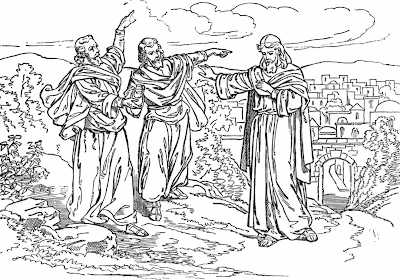 First Reading, Isaiah 53:10-11
First Reading, Isaiah 53:10-11From a Christian perspective, it’s relatively easy to see Jesus as the fulfillment of this prophecy of the suffering servant. From that understanding, the words “long life” would translate into “eternal life” as Jesus is the One Who gave His life as an offering for sin, taking our guilt upon Himself. The sufferings of this Servant would have a redemptive value.
This must have been a difficult concept when this message was first proclaimed. The Jews endured much suffering and spent many hours in prayer, pleading to God for relief; and to hear or read that their hope would be fulfilled by yet more suffering must have seemed absurd.
Today, not even all Christians see a value in suffering. Sadly, some believe that suffering is caused by a lack of faith. From a Catholic point of view, our sufferings are united with Christ's in such a way that we can offer them in union with His redemptive work for the salvation of souls.
Second Reading, Hebrews 4:14-16
In the Old Covenant, a sacrifice required a priest and a victim. In the New and Everlasting Covenant, Jesus Christ, the Son of God, was both Priest and Victim.
One of the many beauties of our relationship with our Lord is that He was willing to take on our way of life by the most humble means possible, making our ability to relate to Him much easier because we know that He has already endured what we endure. Jesus not only lived those circumstances which tempt us and often lead us to our shortcomings, He also took those shortcomings and failures upon Himself making it considerably easier for us to relate to Him. Knowing that, we can indeed, as the last verse says, "confidently approach the throne of grace to receive mercy and to find grace for timely help."
Gospel, Mark 10:35-45
There’s something very alluring about greatness. Many would love to achieve it or minimally be in the presence of it. Many young adults have spent the night outside of an arena just so they could be one of the first in line to buy tickets to see their favorite rock stars. At Hollywood movie premiers, look how many people line up along the red carpet just to get a glimpse of their favorite movie stars. Nowadays, a small fortune is spent to go to professional sporting events to watch athletes perform seemingly super-human feats. Mostly what’s intriguing about greatness is the power, fame and wealth that goes along with it. All of these forms of greatness, however, are short-lived.
In this Gospel, James and John are looking to achieve greatness. And the greatness they are looking for is not exactly what Jesus had in mind. They want to sit at the right and left of Jesus. Jesus tells them they do not know what they are asking. They are thinking of Jesus as the eventual head of some sort of world government; and by sitting at His right and left they would be considered powerful men, at least by human standards. Their minds at this point haven’t really grasped what greatness is in terms of the Messianic mission.
Take a moment and think of those you would consider to be great Christians. If you were able to interview all of them you might find very different personalities, some married, some single, some ordained ministers, doctors, lawyers and ditch diggers. One common denominator, however, that all of them would be able to share with you is the sufferings they have endured. When you are serious about your walk with the Lord, that walk is an extremely difficult one, with many sufferings. Suffering is an inescapable ingredient for not only being a great Christian but also being human. With God’s grace, our acceptance of this makes us great Christians; and this greatness is quite different, if not opposite, of the type of greatness mentioned earlier. In worldly terms, greatness means being served; in Christian terms, greatness means to serve.
The desire of any great Christian is to follow in the Footsteps of Jesus Who suffered and gave His life as a ransom for many. Great Christians have also given their lives literally. But offering one’s life doesn’t have to mean the death of the body. It could mean death to a way of life: a life of immorality, untrustworthiness, greed and anything else that is contrary to what Jesus taught. It is much easier to give up and surrender to these immoralities since today’s world is flooded with such things. Much of the sufferings that Christians endure are the temptations to give up the good fight and surrender to the ways of the culture. But we don’t have to fight it alone. We have our Lord and each other.
Greatness in a worldly sense is often single-minded and perhaps egotistical. Jesus tells His apostles and us, His devoted followers, that among us it shall not be so. Christianity already has One Holy Trinity and there simply isn’t any room for the trinity of me, myself and I. We are called to be servants and slaves, putting the needs of others before our own. If we allow temptation to pollute our minds, this way of life may not sound so great. But our ultimate greatness cannot be achieved in this life; in fact, it cannot be achieved at all by us. Our ultimate greatness is not something we earn; rather, it is given as a gift by the greatest One of all.
